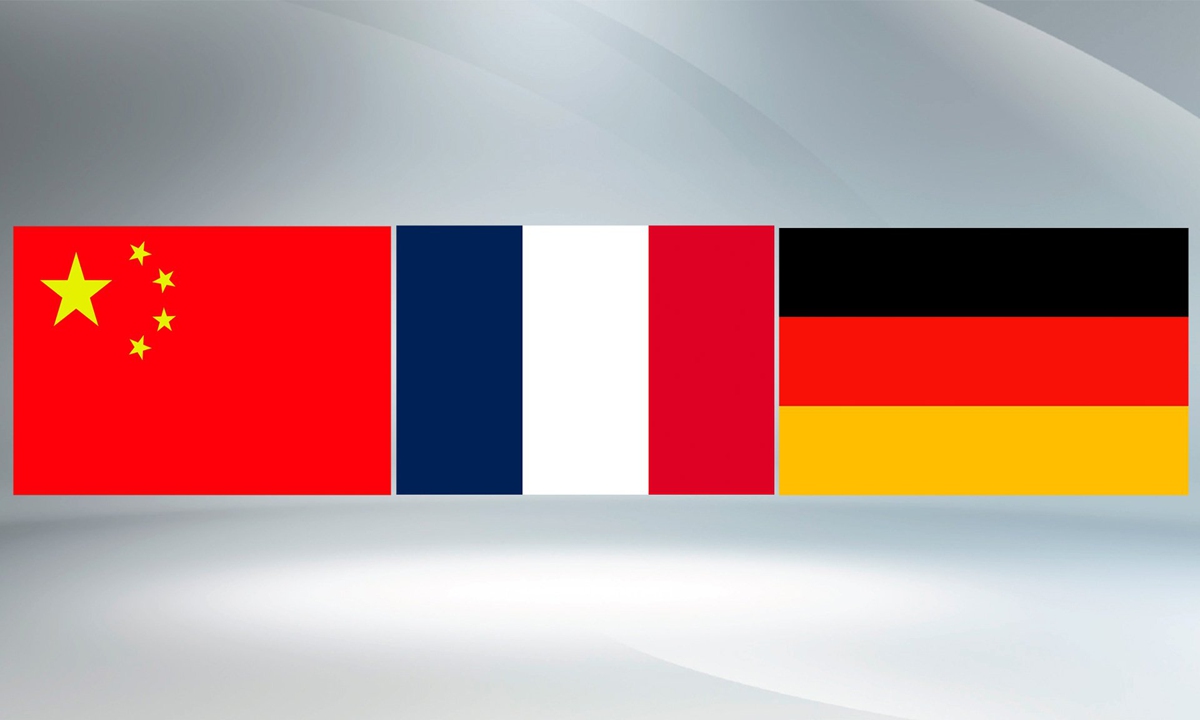
Chinese President Xi Jinping held a virtual summit with French President Emmanuel Macron and German Chancellor Angela Merkel on Monday, calling on China and Europe to expand consensus and cooperation for the two sides to play an important role in tackling the global challenges.
Mutual respect and sincere cooperation are much needed in today's world than ever, not a confrontational stance and zero-sum mentality, Xi told the two European leaders.
Over the past 100 years, the Communist Party of China has united the Chinese people and led them to a path of development that conforms to China's national conditions and is universally supported by the people, Xi said, noting that China and the EU should correctly view each other's differences and rationally deal with divergences and firmly grasp the general direction of China-EU relations.
China is willing to work to push forward the 23rd EU-China summit while holding high-level dialogues covering strategy, trade, people-to-people exchanges, digital and climate change, Xi said at the virtual summit.
Given the epidemic control situation, China will also streamline channels for people exchanges, Xi said, noting that China is steadfast in expanding the opening-up and he hopes that the EU will provide Chinese companies with a fair, transparent and nondiscriminatory business environment in accordance with market principles.
Xi's emphasis on holding a correct understanding about each other's differences as the first thing during the online summit is a direct warning to Europe's recent misperception of China and interference in Chinese internal affairs, which can also be interpreted as timely guidance for future China-EU ties, Cui Hongjian, director of the Department of European Studies at the China Institute of International Studies, told the Global Times on Monday.
"Also, the frequent interactions between the US and the EU in June alerted the potential risk of the EU being misled by the US' biased ideology against China. The summit also showed that China hopes that China-EU bilateral ties should be based on an independent strategy and out of the EU's real development interests," Cui said.
Xi also urged upholding multilateralism and abiding by the international system and UN Convention as well as international relations norms.
Countries should negotiate on different issues in a peaceful way, and China is willing to ensure that work on the biodiversity convention and climate change convention yields positive results, leading the WTO reform to the correct direction, while supporting the Beijing 2022 Winter Olympics and Paris 2024 Summer Olympics.
"The second half of the year should be a valuable period for the two to return to the track of cooperation, given many areas to cooperate on their agenda, such as climate change and biodiversity, G20, and medical cooperation - typical areas with mutual support -scheduled in upcoming months," Cui said.
China-EU relations have seen some ups and downs in recent months. For instance, the European Parliament voted to freeze the China-EU Comprehensive Agreement on Investment (CAI) in May, putting the brakes on ratifying the massive deal that is envisioned to assist the 27-nation bloc's economic recovery amid lingering COVID-19 woes.
In March, the Council of the European Union imposed restrictive measures on four Chinese nationals and one entity as a reaction to the alleged mistreatment by China of its minority Uygur population in Northwest China's Xinjiang Uygur Autonomous Region. And in response to the EU move, the Chinese government hit back with tit-for-tat countermeasures by sanctioning 10 individuals and four entities that have spread rumors and lies about Xinjiang.
China has also been a trending topic in the latest communication between the EU and the US. During US President Joe Biden's 8-day trip to Europe in June, the US had tried to fix transatlantic relations, and reach some vague consensus with his G7 and NATO allies on confronting China.
The timing of Monday's online meeting is significant as Merkel plans to visit the US and Macron is in need of China's support ahead of next year's election, Wang Yiwei, director of the institute of international affairs at the Renmin University of China, told the Global Times on Monday.
"Both of them have seen the unreliability and volatility in US policies. They know that China is a reliable partner in dealing with issues like climate change," he said.
Both French and German leaders echoed Xi's pledge to expand the cooperation and consensus between China and the EU, expressing the support for the China-EU CAI. France will continue pushing forward cooperation with China in a practical manner, and welcomes Chinese enterprises to invest in France, and is willing to maintain communication with China on a number of issues such as WTO reform, climate change and biodiversity, Macron said.
Merkel said that Germany is willing to strengthen cooperation on equal vaccine production and distribution as well as resumption of trade and people exchanges. There are many areas where China and the EU can work together, and the two sides should increase dialogues in order to reduce divergences, she said, noting that she hopes the China-EU investment deal can be ratified soon.
The three leaders also exchanged views on Africa-related topics, and China has already provided COVID-19 vaccines to over 40 African countries and the African Union Commission, actively supporting the continent's localized vaccine production.
Africa, as mentioned in the summit, can also be a key target of combined efforts on issues such as fighting the epidemic and debt relief which can be a key discussion at the G20, according to Chinese experts.
Xi repeatedly stressed the need to practice a people-centered philosophy of development during his speech at the CPC's 100th anniversary, and such philosophy is surely what the EU values in their culture. This is an example of how to "find a common ground for strategic partnership", Wang said.




